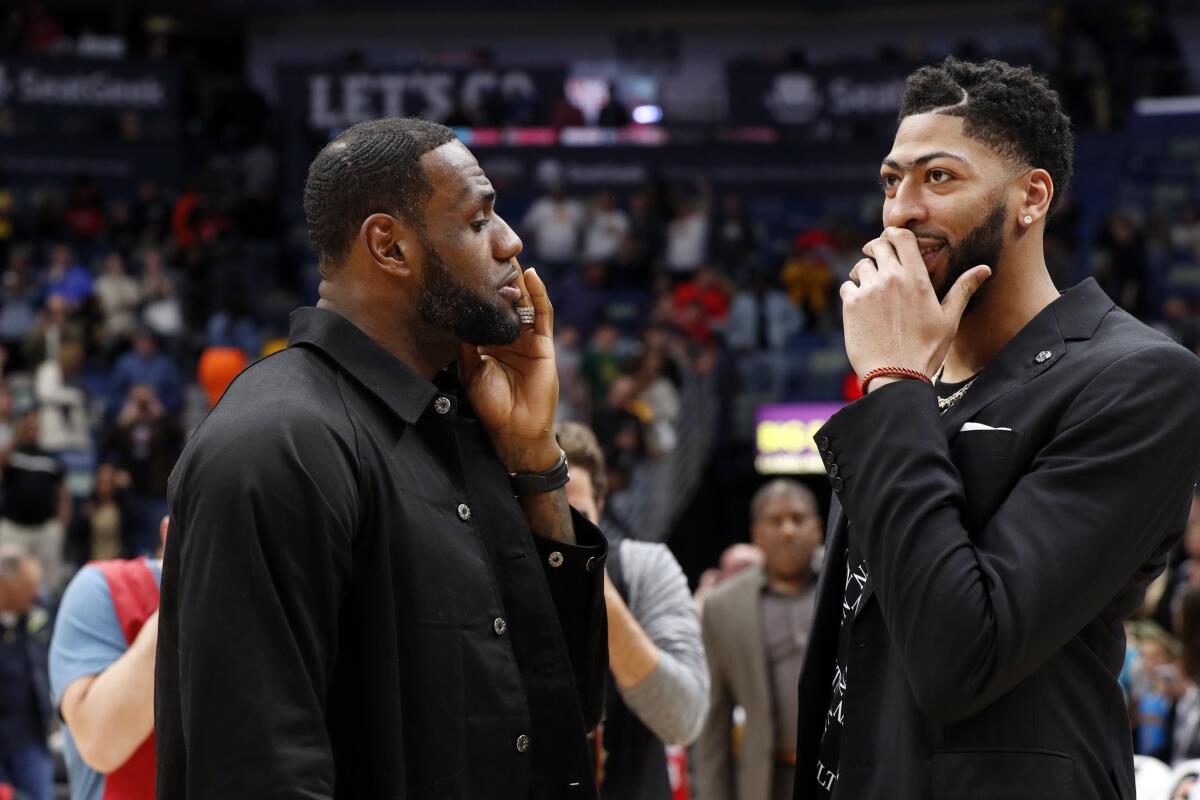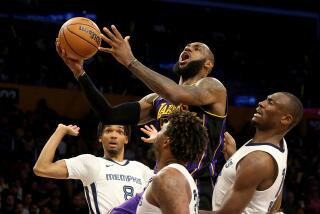Column: Lakers pulled off the Anthony Davis trade because they are the Lakers

- Share via
Magic Johnson didn’t make many right calls as the Lakers’ president of basketball operations, so it’s little wonder he credited the wrong people for the Anthony Davis trade.
General manager Rob Pelinka didn’t make the trade happen. Co-owner Jeanie Buss didn’t either.
Rich Paul did.
The agent strong-armed the New Orleans Pelicans into trading Davis. He used the threat of his client’s impending free agency to limit their potential trade partners to the Lakers and New York Knicks, who didn’t have the necessary assets to complete the deal. He also helped set in motion the previous attempt by the Lakers to acquire Davis, which eviscerated whatever little harmony existed in their locker room and gave Pelinka no option but to break up the forced marriage between LeBron James and the team’s young nucleus.
Pelinka and Buss were practically bystanders, the accidental beneficiaries of Paul’s maneuvering.
The often pathetic but ultimately triumphant saga of how the Lakers landed Davis is the latest reminder of how it’s better to be clueless and born on third base than a smart and industrious commoner.
The Lakers are the one NBA franchise that can fail upward.
Sign up for our daily sports newsletter »
This wasn’t a triumph of their front office. This was a victory for their brand.
They are the basketball equivalent of Donald Trump, who parlayed his inherited wealth into an image that allowed him to overcome his inability to spell or run a casino.
Regardless of how dysfunctional they are, regardless of how buffoonish the owner is, the Lakers have a championship history and a desirable zip code.
Tying the Knicks for the worst record in the NBA over the last six seasons doesn’t change that. Neither does a Three Stooges front office.
OK, so maybe that alone wasn’t enough. Trump needed the Russians. The Lakers required the help of Paul, who also happens to represent James.
The point is that Paul wanted Davis on the Lakers. That’s what’s important to remember here, that James and Davis aren’t Lakers because the Lakers wanted them. They are Lakers because they wanted to be Lakers.
Naysayers, myself included, forgot how strong this force can be — strong enough for a downtrodden team to acquire generational talents in successive offseasons.
The only other acquisitions as significant in recent years were James’ return to Cleveland, Kevin Durant’s move to Golden State and Kawhi Leonard’s trade to Toronto.
For the teams like the Cavaliers, the Warriors and the Raptors, these were once-in-a-lifetime opportunities.
Not the Lakers.
Kobe Bryant orchestrated a draft-day trade to them. Shaquille O’Neal came to them as a free agent.
Much of the attractiveness of the Lakers has been attributed to late owner Jerry Buss, and rightfully so. But moves like this predated Buss, with Wilt Chamberlain and Kareem Abdul-Jabbar facilitating deals to the Lakers. They didn’t stop when Jim Buss inherited control of the team from his father, as they were able to trade for Dwight Howard in what was considered a monumental deal at the time.
In retrospect, was it really a surprise a player of Davis’ stature wanted to play for the Lakers?
Their co-tenants at Staples Center, the Clippers, are in the exact opposite situation as them. The Lakers now have to do what the Clippers have already done, which is to create the proper environment to support their superstars. Conversely, the Clippers still have to do what the Lakers have done, which is to attract elite talent.
The Clippers are smarter than the Lakers. They have a better idea of what they want to do. From owner Steve Ballmer to coach Doc Rivers, they have superior leadership.
And, somehow, they suddenly find themselves behind the Lakers.
That doesn’t mean any of the previous concerns about the Lakers were unjustified.
They have been slow to embrace the league’s analytics revolution.
They have discarded coach after coach, which points to something other than the coach being the problem. They botched their most recent search and settled for an uncomfortable arrangement in which presumed coach-in-waiting Jason Kidd will work as an assistant under Frank Vogel.
Johnson’s function on the team turned out to be more or less what LaVar Ball said it was, making this perhaps the one time Ball was right about something since the Lakers drafted his son.
Nothing in Pelinka’s track record points to him being able to place the right players around James and Davis. He certainly didn’t surround James with a capable supporting cast last season, when he might as well have shoved James into a clown car.
As much as Pelinka gave up for Davis, he failed to construct the trade in a manner that would give the Lakers another max slot, which they need to also sign the likes of Kyrie Irving or Kemba Walker. Pelinka is exploring options to modify the deal, according to Times beat writer Tania Ganguli.
The consensus is that Pelinka overpaid for Davis, as he gave the Pelicans control over their drafts through 2025.
Say that’s true. Say the Lakers have mortgaged their future. And say the pairing of James and Davis fails to win a championship that would justify such an investment.
It probably won’t matter.
Another superstar will want to come to Los Angeles. It’s happened before. It will happen again.
Follow Dylan Hernandez on Twitter @dylanohernandez
More to Read
All things Lakers, all the time.
Get all the Lakers news you need in Dan Woike's weekly newsletter.
You may occasionally receive promotional content from the Los Angeles Times.







